HOW CAN WE HELP YOU? Call 1-800-TRY-CHOP
In This Section
Supporting Our Scholars at First Postdoctoral Fellow Town Hall
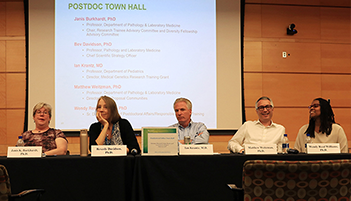 “What does Children’s Hospital of Philadelphia do to support you as postdocs, and how can we do better?” That was the key question addressed at the first-ever Annual Postdoctoral Fellow Town Hall, hosted by the Office of Academic Training and Outreach Programs (ATOP) at the Research Institute June 20.
“What does Children’s Hospital of Philadelphia do to support you as postdocs, and how can we do better?” That was the key question addressed at the first-ever Annual Postdoctoral Fellow Town Hall, hosted by the Office of Academic Training and Outreach Programs (ATOP) at the Research Institute June 20.
Taking the form of a Q&A panel session, the event gathered postdoctoral scholars across diverse departments of the Research Institute along with administrative and faculty leaders who direct research support and training programs. The goal: Hear from our talented and hard-working fellows on how the Research Institute can help to propel them toward a future of breakthroughs.
In true town hall style, five panelists answered questions from the audience and weighed in on topics that came up in small focus groups of CHOP postdocs. From navigating the mentor/mentee relationship, to exploring a wide range of career opportunities, to negotiating the end of a fellowship, and more, the discussion addressed the current landscape that postdoctoral fellows face as they build successful and satisfying careers.
The event’s panelists included Janis Burkhardt, PhD, professor and investigator in the Department of Pathology and Laboratory Medicine; Beverly Davidson, PhD, Chief Scientific Strategy Officer; Ian Krantz, MD, physician in the Division of Genetics; Matthew Weitzman, PhD, professor and investigator in the Department of Pathology and Laboratory Medicine; and Wendy Reed Williams, PhD, director of ATOP.
Moderated by David Taylor, PhD, assistant director of the ATOP, the event also shared the myriad resources available to the next generation of research scientists at CHOP. In the last year alone, the ATOP has provided over 230 hours of career counseling and mentorship-related work to scholars. And over the next year, the ATOP plans to improve their outreach and engagement with more focus groups and surveys, continue to develop its programs and resources, and launch a grant proposal development workshop in the fall.
To celebrate this new annual series of information sessions for our postdocs, we wanted to share some nuggets of tips, advice, and information that came out of Wednesday’s Town Hall.
What does the panel think about the uncertainty that early-career researchers might face when it comes to job security, career success, and/or securing grant funding?
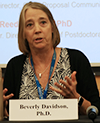 Dr. Davidson: In my opinion, it couldn’t be a better time to enter the biomedical community. You have such a breadth of opportunities available, from small bio-tech, to big pharma, to startup companies, and lots of different opportunities to take part in. Our ATOP faculty — many of whom were postdoctoral fellows once themselves — are great examples of how you can take your research or science experience into a career of helping to advance training opportunities. When I was a postdoc, the choice was either become a principal investigator or work for a pharmaceutical company. Now, it’s not a single set of opportunities. There is so much flexibility to go back and forth.
Dr. Davidson: In my opinion, it couldn’t be a better time to enter the biomedical community. You have such a breadth of opportunities available, from small bio-tech, to big pharma, to startup companies, and lots of different opportunities to take part in. Our ATOP faculty — many of whom were postdoctoral fellows once themselves — are great examples of how you can take your research or science experience into a career of helping to advance training opportunities. When I was a postdoc, the choice was either become a principal investigator or work for a pharmaceutical company. Now, it’s not a single set of opportunities. There is so much flexibility to go back and forth.
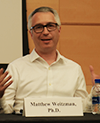 Dr. Weitzman: A postdoctoral fellowship is a stressful time; it’s a limbo time. There is uncertainty about the future. But there are jobs out there. It was stressful when all of us were postdocs, and it is still stressful now. Now, however, there is a lot more structure and support, where people already know what it’s like to be a postdoc. As [Dr. Davidson] says, the number of options has exploded, and your skillset is transferrable to that. There are lots of other jobs besides being a principal investigator that you can love. Your training as a postdoctoral fellow is really transferrable, whether it’s the writing skills, or the presentation skills, or something else, like skills in computational biology.
Dr. Weitzman: A postdoctoral fellowship is a stressful time; it’s a limbo time. There is uncertainty about the future. But there are jobs out there. It was stressful when all of us were postdocs, and it is still stressful now. Now, however, there is a lot more structure and support, where people already know what it’s like to be a postdoc. As [Dr. Davidson] says, the number of options has exploded, and your skillset is transferrable to that. There are lots of other jobs besides being a principal investigator that you can love. Your training as a postdoctoral fellow is really transferrable, whether it’s the writing skills, or the presentation skills, or something else, like skills in computational biology.
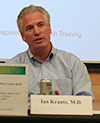 Dr. Krantz: I agree. What’s changed is the support and encouragement for the best and brightest to be successful. It is a good time to be in the position you are in.
Dr. Krantz: I agree. What’s changed is the support and encouragement for the best and brightest to be successful. It is a good time to be in the position you are in.
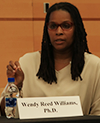 Dr. Williams: In the past 10 years, we’ve seen a sea change in how employers view PhD-trained scientists. There are more jobs and a greater diversity of jobs available to you now, because employers from a wide variety of industries are seeing more and more PhDs enter the workforce and recognize the value of postdoc fellowships. We’ve spoken a bit about career options, but that’s not to discourage those interested specifically in academics and faculty positions. Just recently, the National Academies of Science, Engineering and Medicine published a report on recommendations to support next generation scientists, which includes the development of new funding opportunities for early-career scientists and a focus on increasing staff scientist positions at research institutions. Funding will always be uncertain, but the NIH and others are taking steps to ensure that scientists will continue to thrive in the future.
Dr. Williams: In the past 10 years, we’ve seen a sea change in how employers view PhD-trained scientists. There are more jobs and a greater diversity of jobs available to you now, because employers from a wide variety of industries are seeing more and more PhDs enter the workforce and recognize the value of postdoc fellowships. We’ve spoken a bit about career options, but that’s not to discourage those interested specifically in academics and faculty positions. Just recently, the National Academies of Science, Engineering and Medicine published a report on recommendations to support next generation scientists, which includes the development of new funding opportunities for early-career scientists and a focus on increasing staff scientist positions at research institutions. Funding will always be uncertain, but the NIH and others are taking steps to ensure that scientists will continue to thrive in the future.
When it comes to teaching opportunities or breaking into industry, how can a postdoctoral fellow stay competitive? How do you get the experience to get these jobs, or even just learn more about them?
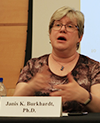 Dr. Burkhardt: The trick is to get a bead on where you want to go. And know what the ideal job looks like for you – whether it’s pure academia or if it will involve teaching or consulting, or something else. The most elemental principle is that you want to develop a track record of demonstrated interest in that area. You want to demonstrate that it’s not a last-minute decision. So the question is, what do we do to get meaningful things on your CV to show you’ve been thinking down this road for a while? One example, when it comes to teaching, is the Penn Postdoctoral Opportunities in Research and Teaching Program (PennPORT), where you gain teaching experience at Penn with three years of National Institutes of Health (NIH) funding. But as the Research Trainee Advisory Committee, we also need to create something that can accept more people while also giving formal didactic training and engaging postdocs more widely. The Committee is thinking about this right now.
Dr. Burkhardt: The trick is to get a bead on where you want to go. And know what the ideal job looks like for you – whether it’s pure academia or if it will involve teaching or consulting, or something else. The most elemental principle is that you want to develop a track record of demonstrated interest in that area. You want to demonstrate that it’s not a last-minute decision. So the question is, what do we do to get meaningful things on your CV to show you’ve been thinking down this road for a while? One example, when it comes to teaching, is the Penn Postdoctoral Opportunities in Research and Teaching Program (PennPORT), where you gain teaching experience at Penn with three years of National Institutes of Health (NIH) funding. But as the Research Trainee Advisory Committee, we also need to create something that can accept more people while also giving formal didactic training and engaging postdocs more widely. The Committee is thinking about this right now.
 Dr. Weitzman: Whatever you do should be passion-based. It should be based on who you are and what you are excited about. So when it comes to teaching, it should be, ‘I want to teach; that’s what I want to do’. Same with academia — you should want it because you want to be an academic.
Dr. Weitzman: Whatever you do should be passion-based. It should be based on who you are and what you are excited about. So when it comes to teaching, it should be, ‘I want to teach; that’s what I want to do’. Same with academia — you should want it because you want to be an academic.
How can a postdoctoral fellow identify a good mentor? Who should be your mentor?
 Dr. Weitzman: The success of your career, from this stage on, is going to be based on networking. In this room alone, are 40 or 50 other peers who form a great network. Then there’s people in administration, leadership, and so on. So it’s important to get out of your straightforward work environment and work with as many people as you can. That’s why these postdoc events are a great opportunity to meet other PI’s and other peers. And I’m sure all of you are part of different communities at Penn and CHOP — that’s the strength of this campus. These communities give us interactions, and those interactions give us opportunities to test out to see who would give the right advice and be a good mentor. Different people will have different perspectives, and you will probably need advice on different levels of your career.
Dr. Weitzman: The success of your career, from this stage on, is going to be based on networking. In this room alone, are 40 or 50 other peers who form a great network. Then there’s people in administration, leadership, and so on. So it’s important to get out of your straightforward work environment and work with as many people as you can. That’s why these postdoc events are a great opportunity to meet other PI’s and other peers. And I’m sure all of you are part of different communities at Penn and CHOP — that’s the strength of this campus. These communities give us interactions, and those interactions give us opportunities to test out to see who would give the right advice and be a good mentor. Different people will have different perspectives, and you will probably need advice on different levels of your career.
 Dr. Williams: I agree. A postdoc fellowship at CHOP is limited to five years, and many are shorter than that. We want you to get networking as early as you can to identify mentors who will support your career, give you good advice, and potentially get you jobs. Many fellows receive secondary mentorship from their PhD advisors, which is great, but I’d encourage you to think bigger. You need a team. If you’re interested in industry jobs, build a network with scientists at pharma companies. If you’re interested in science writing, talk to past postdocs who have made that transition. We know that networking is not second nature and that building a mentorship relationship can be tough, but that’s why our office is here to support you.
Dr. Williams: I agree. A postdoc fellowship at CHOP is limited to five years, and many are shorter than that. We want you to get networking as early as you can to identify mentors who will support your career, give you good advice, and potentially get you jobs. Many fellows receive secondary mentorship from their PhD advisors, which is great, but I’d encourage you to think bigger. You need a team. If you’re interested in industry jobs, build a network with scientists at pharma companies. If you’re interested in science writing, talk to past postdocs who have made that transition. We know that networking is not second nature and that building a mentorship relationship can be tough, but that’s why our office is here to support you.
Do you have any advice for postdoctoral fellows who feel like they don’t have many choices when choosing a career?
 Dr. Weitzman: I think there are more ways to test your different options than there’s ever been. The internet provides a wealth of useful information. There are more opportunities to do different ‘styles’ of careers. For example, academia and industry are choices — they’re not the same job in two different places. So for some of us, academia suits who we are. But it’s not right for everyone. And the same goes for industry. I encourage you to know what you are good at and what your passions are, and then find the right job that matches them.
Dr. Weitzman: I think there are more ways to test your different options than there’s ever been. The internet provides a wealth of useful information. There are more opportunities to do different ‘styles’ of careers. For example, academia and industry are choices — they’re not the same job in two different places. So for some of us, academia suits who we are. But it’s not right for everyone. And the same goes for industry. I encourage you to know what you are good at and what your passions are, and then find the right job that matches them.
 Dr. Williams: I agree. I think you have more choice than you might think!
Dr. Williams: I agree. I think you have more choice than you might think!
These are only a few of the responses from Wednesday’s remarkably helpful panel session, and only a small slice of the questions covered!